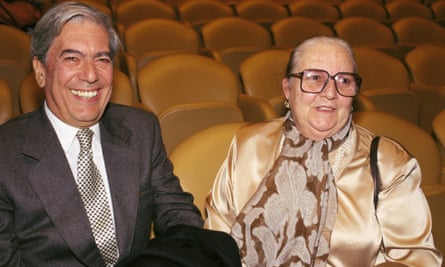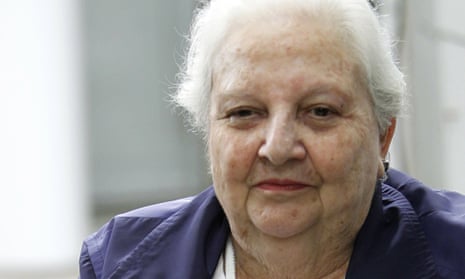In the offices of Carmen Balcells, in the Diagonal business district of Barcelona, the conference room is lined with red box-files of final proofs. On their spines, the most famous names in late 20th-century Spanish and Latin American literature are picked out in gilt: Gabriel García Márquez, Pablo Neruda, Mario Vargas Llosa and Julio Cortázar; the Barcelona novelists Juan and Luis Goytisolo, Juan Marsé and Manuel Vázquez Montalbán; and more recent writers such as Isabel Allende and Javier Cercas.
Balcells, who has died aged 85, represented all of these, and many more: 300 or so writers, including six Nobel prize-winners. She is often referred to as the driving force behind the Latin American explosion of literary talent in the 1960s, dubbed the Boom, and its associated style, magic realism.
Vargas Llosa tells the story of how, in mid-1960s London, he was struggling to make ends meet while writing Conversación en la Catedral (Conversation in the Cathedral, 1969). Balcells saw genius in his earlier novels, travelled to England, asked him how much he needed to live on and paid him $500 a month to work only on his novel. In return, of course, Vargas Llosa agreed to be represented by her.
The anecdote encapsulates her prescience, her nose for literary talent, her fearless energy, and the lifelong loyalty most of that generation of writers felt toward her.
She did far more than negotiate publishing contracts. She found flats for her clients, arranged schools for their children and sought to organise their personal lives, so that (in theory) they need worry about nothing other than writing.
She also loved the grand public gesture. When García Márquez received the Nobel prize in 1982, she flooded Stockholm with yellow flowers. And when Juan Marsé celebrated his 60th birthday in 1993, she threw a Gatsby-like party for him.
Her writers’ loyalty to her was based not only on her generosity but on her business ability. Hard-working and brilliant, at times tyrannical, Balcells was the toughest of negotiators. She introduced clauses into contracts that limited publishing rights to short periods, rather than for life. She increased remuneration for translations and film adaptations and introduced audits of publishers to avoid the widespread fraud current at the time. Feared by publishers, she placed writers at the centre of the literary process.
Balcells was the oldest child of rural landowners in the inland Catalonia province of Lleida. Her father, Ramon, was an uneducated farmer, who became immensely proud of his daughter’s academic achievements. Her mother, Mercè, knew French and played the piano, and urged Balcells to study a practical career, the key to a woman’s independence.
Balcells recalled in her rare interviews a happy childhood, as the only girl with three younger brothers. In the 1936-39 civil war, her large house was filled with numerous cousins evacuated from Barcelona. After the war, the family moved to Barcelona, and she boarded with the academically minded Teresian nuns in the city. In 1949 she graduated with honours in accountancy and went to work for the guild of knitting machine manufacturers.
Through writer friends, in 1956 she became the Barcelona representative of ACER, the Madrid-based literary agency of an exiled Romanian novelist, Vintilă Horia. When Horia won the French Prix Goncourt in 1960, he sold the agency and moved to Paris. Balcells set up on her own with some of his clients.
A native Catalan speaker and hostile to the Franco dictatorship, Balcells channelled her energies into her work. Her path was not all roses. In 1965 she toured Latin America to sign up writers. She contacted the then obscure García Márquez and was delighted to negotiate $1,000 for a translation into English of one of his early books. “Gabo”, conscious of his own worth, was scornful of the deal, but their relationship recovered and he became the flagship of her business, with One Hundred Years of Solitude (1967) selling more than 30m copies in 37 languages. He and many other Boom writers moved to Barcelona for several years at the end of the 1960s, attracted, at least in part, by their “superagent”.

In 2000 Balcells retired from the agency, but she returned to active work in 2008 after the business had lost important clients, such as the Roberto Bolaño estate, seduced by the US agent Andrew Wylie. With Wylie, her equivalent in the Anglo-Saxon world, she signed an accord in May 2014 to create a joint agency, Balcells-Wylie. Byzantine negotiations remained inconclusive at her death: Wylie believed that Balcells lived too much on past glories, while Balcells, many thought, was reluctant to relinquish control.
In 1993 she sold 50,000 books to the national library of Catalonia. In 2010, she sold her archives, containing 50 years of contracts, letters, manuscripts and her business diaries, to the Spanish Ministry of Culture for €3m.
Balcells married Luis Palomares in 1961. He died in 2010 and she is survived by their son, Luis Miguel, and three granddaughters.

Comments (…)
Sign in or create your Guardian account to join the discussion